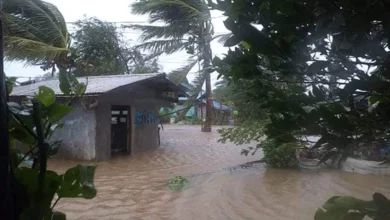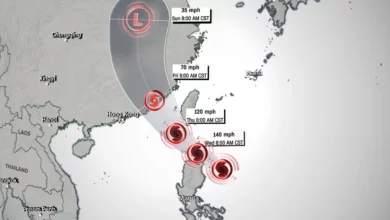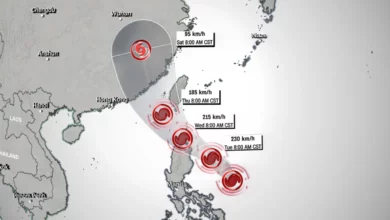
At an apartment in Maadi, Irene (not her real name) watches her friend browse through her Facebook feed. A photo clicked reveals a Cairo delivery room where a white American man holds his newborn at the bedside of his Filipino wife.
"She's the lucky one," Irene points to the monitor.
The first wave of Filipinos to arrive in Egypt was during the 1950s when Filipino Muslims came on state-sponsored scholarships to study at Egyptian universities like Al-Azhar. Since then, an informal Filipino community in Egypt has thrived in segments. According to Irene, there are five “clubs” of Filipino expats in Cairo who meet regularly to celebrate holidays and special occasions and who are associated by class, profession, age or status and are often centered on a shared Christian faith. Most of these clubs, however, consist of Filipinas, or Filipino women, married to Egyptians and foreigners and their children. Some of them are professionals in the medical field.
But for Filipinas like Irene, the sense of belonging to a community provides not only a cultural association but also a more important safety net.
For the last seven years, Irene has worked as a domestic helper in Egypt without a proper visa. Her status — or non-status — leaves her susceptible to abuse from employers and at the constant risk of deportation.
A reported 6,500 overseas Filipino workers, or OFWs, as they are commonly called, have been eking out a living in Egypt, worlds away from their families in the Philippines. Coverage of migrant workers and remittance-based economies is not new to the region, especially with regards to OFWs in the Middle East. But Egypt’s population of OFWs is more vulnerable to abuse without recourse or protection because the majority of them are undocumented.
Egypt at the moment holds no official labor agreement with the Philippines. Under current Egyptian law, only diplomats and expats are allowed to hire foreign domestic work.
Irene spoke with Egypt Independent at a cafe in Maadi, where many OFWs are employed, and where according to Irene, her friends wouldn't dare set foot.
"They aren't so willing to come out here because they're scared of getting caught by immigration since they don't have papers. But unlike me, even though I don’t have papers, my spirit is strong ever since I escaped," Irene said.
Irene moved to Egypt in 2006. Initially, an agency in the Philippines had setup a legal contract for her to work as a live-in in Jordan; but once she arrived in Amman, the local agency informed her that they had failed to secure her a position.
“So they sold me to another agency, and that's what they do. They do human trafficking,” she said.
The agency sent Irene to Cairo on a one-month tourist visa. Upon arrival, she shifted through placements, eventually fixing a two-year contract with the family of a popular Egyptian actress.
There, said Irene, she and other domestic workers faced verbal, physical and even sexual abuse. And because the family kept her passport and because she had no legal status in the country, she endured her employer’s maltreatment for three years.
“Once the agency sells you, you’re on your own. We couldn’t just quit because she bought you. As I know, they pay about 2,000 USD per person. You live in the house and so food is included. But the woman would slap and punch us, and when we’re sleeping her husband would come in and touch and kiss,” she said.
Throughout their time, according to Irene, they had attempted to escape but failed due to intense supervision and confinement to the house.
“Only two times during those years they allowed us to go to church with a bodyguard. And when they were on vacation, we have been to Carrefour with bodyguards again, but then that's all. When my friend tried to escape in 2008, the driver caught her and our boss locked her in a room and whipped her with a belt,” she recounted.
In 2009, while their employer was vacationing abroad, she and two others managed to flee the compound and find refuge at the Philippine Embassy.
Irene was advised by the embassy to lie low, she said, and for the last four years has enjoyed working part-time to support her mother and her two children in the Philippines, whom she hasn’t seen since her departure.
“During the time of Mubarak, immigration was really tight. Now, they’re easing because of all the problems they have. But before, I would wear a hijab to hide my identity so they wouldn't think I was Filipino,” Irene said.
After hearing success stories of other illegal OFWs who have left Egypt, she recently visited the Passport and Immigration Office to request permission to return to the Philippines. There, she discovered a pending case against her, assumedly filed by her previous employer at the time of her escape. Despite the possibility of incarceration, she remains resilient.
“I’m not afraid. My contract with them was only for two years, and they just extended for a third year. I could also reveal many things that happened there. I would fight in court if they want to. I know how to speak in Arabic and I know how to fight. But if they arrest me, they might just then deport me. But that’s what I want,” she said.
For now, as a freelancer — as she calls herself — Irene can afford to meet up with other Filipinos and enjoys the occasional import brought by other OFWs from home like dried mangoes and shrimp paste.
Having lived in Egypt for seven years without a break, she speaks nearly fluent Egyptian and has adapted to Cairo life.
“Here there isn’t a real Filipino community like in Dubai. But one time, I was able to eat pork [a Filipino staple]. We marinated it and made barbecue. But when I ate it, I couldn’t really tell if it was pork or beef, and I grew very sick. I have become used to eating Egyptian food,” she said.
This piece was originally published in Egypt Independent's weeklyprint edition.




